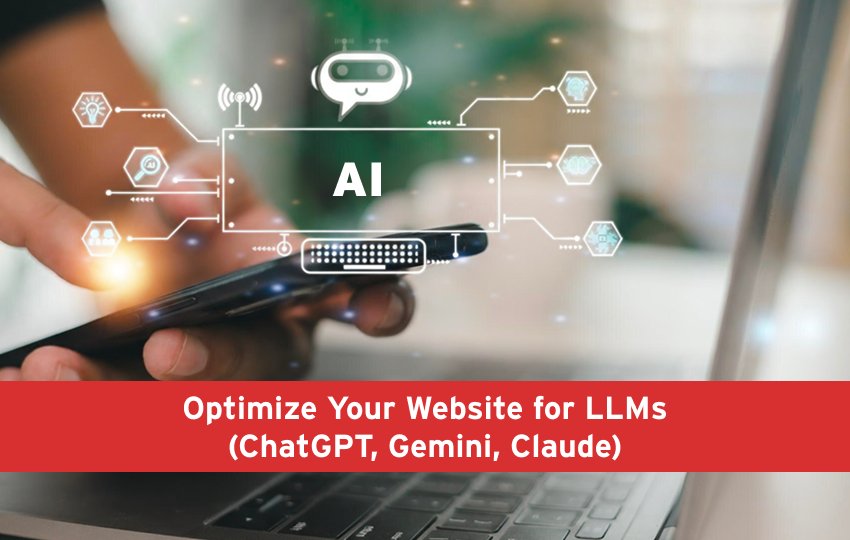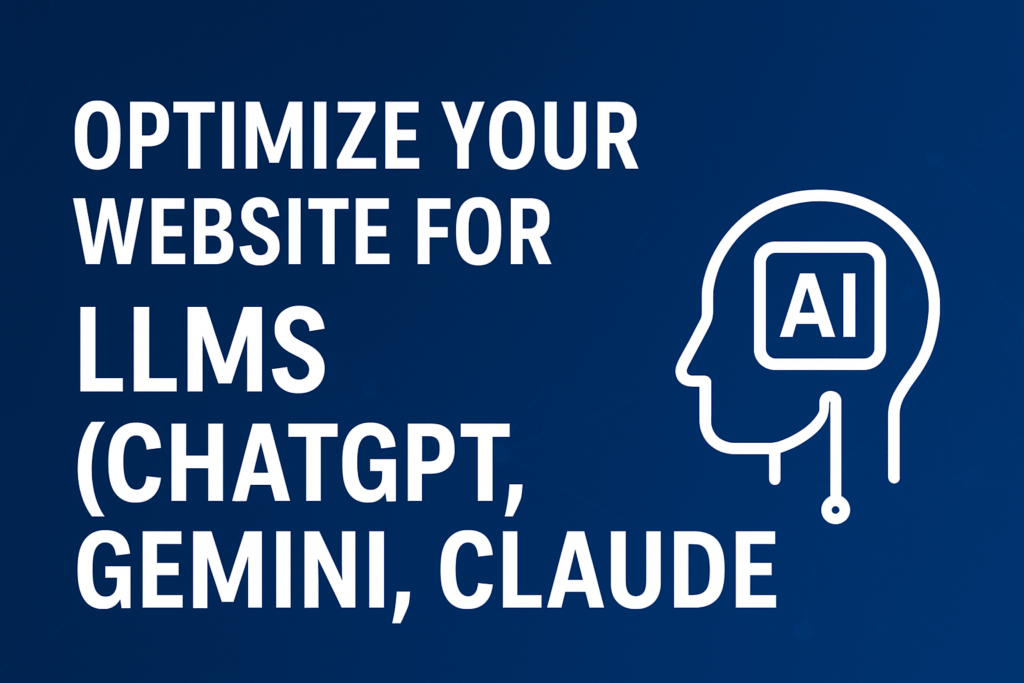
Optimize Your Website for LLMs (ChatGPT, Gemini, Claude)

Large Language Models (LLMs) like ChatGPT, Gemini, and Claude are quietly changing how people discover brands online. Instead of searching and clicking links, users are asking questions — and trusting the AI’s response as the final answer. For brands, this means visibility now depends not only on Google ranking, but also on AI discoverability. If your brand isn’t part of the data these models draw from, it’s effectively invisible in the new layer of search.
Optimise Your Website for LLM Models
With Google Search, you can do keyword research and optimize your pages. But with LLMs like ChatGPT or Gemini, you don’t know what prompts people to use. So how do you optimize your website for these AI models?
Let’s break this down → simple, clear, no jargon.
1. First, understand the difference
- Google Search = You rank by matching keywords people type in. You target “sarees for winter” → get traffic if you rank.
- LLMs (ChatGPT, Gemini, Claude) = People don’t just type keywords, they ask natural language questions:
– “What sarees are good for winter weddings?”
– “Where can I buy eco-friendly water bottles online?”
👉 These tools don’t just match words. They predict answers based on patterns in text they were trained on + data they can access (like browsing or plugins).
So the optimization isn’t keywords, it’s knowledge representation.
2. What LLMs look for when giving answers
Think of an LLM like a student preparing an open-book exam:
- It doesn’t memorize everything.
- It looks at the book (internet content), and picks the clearest, most structured, and most credible explanation.
That means your site must be:
✅ Clear – Write in simple, direct answers.
✅ Structured – Use headings, FAQs, schema, tables, lists.
✅ Credible – Show expertise, trust, and authority.
3. Metrics you should focus on (instead of keywords)
Measure how well your content serves AI answers.
- Coverage → Do you have content that answers the exact questions people may ask AI?
- Clarity → Is your content easy for a model to digest and paraphrase?
- Structure → Do you have schema markup, FAQs, How-to guides, comparison tables, glossaries?
- Authority → Are you cited by other sites? (LLMs pick content that’s referenced elsewhere more often.)
Freshness → LLMs prefer updated data.
4. How to actually optimize for LLMs (step by step)
🔹 Step 1: Think in questions, not keywords
- Instead of “saree in winter,” think:
1. “Which saree fabric is best for winter?”
2. “Can I wear silk sarees in December weddings?”
3. “How to style a saree with a winter blouse?”
Write content that directly answers these.
🔹 Step 2: Build structured knowledge
- Use FAQ schema.
- Add definitions, glossaries, product comparisons.
- Create step-by-step guides (AI loves this).
🔹 Step 3: Add evidence of expertise
- Author bios → Who wrote the content.
- Case studies, stats, references.
- Show “we’re a real business” → address, about page, credibility signals.
🔹 Step 4: Optimize for snippets
- Use short, clear summary paragraphs (40–60 words) after headings.
- Example: “Yes, you can wear a silk saree in winter weddings. Pair it with a velvet blouse and woolen shawl for warmth without losing elegance.”
🔹 Step 5: Make content machine-friendly
- Use schema markup (FAQ, HowTo, Product, Organization).
- Use alt text, captions, and structured headings.
Keep language simple → no unnecessary fluff.
5. Things to keep in mind
- You’re not optimizing for search rankings. You’re optimizing to be quoted.
- Think like a teacher. Write so clearly that an AI can lift a sentence and use it as an answer.
- Consistency matters. If you publish on multiple platforms (LinkedIn, Medium, YouTube), you increase chances of being “seen” by the model.
Long-term game. The more your brand is mentioned across the web, the more likely LLMs are to surface it.
✅ Clear optimization way for LLMs:
- Focus on questions, not keywords.
- Use structured content + schema.
- Write clear, quotable answers.
- Show expertise + trust.
- Distribute across the web to increase mentions.
Moreover:
- Definitions & glossaries = Be a dictionary.
- Product comparisons = Be a guide.
- Short summary paragraphs = Be quotable.
- Structured headings = Be organized.
- No fluff = Be direct.
- Optimizing to be quoted = Write in soundbites.
- Be everywhere = Increase your chances of being chosen by AI.
How LLMs Actually Read and Retrieve Information
A short, visual-friendly explainer (diagram/table) on how models like ChatGPT and Gemini process web data:
- Trained on text patterns → identify clarity + consistency.
- Use retrieval systems (like Bing API or browsing) → pick structured and cited pages.
- Prefer concise, expert-backed phrasing.
This gives readers technical grounding—makes your advice feel data-informed.
Conclusion:
Optimizing for LLMs isn’t about chasing keywords—it’s about building content that’s clear, structured, and credible enough to be quoted. By focusing on questions, schema, and authoritative answers, you position your brand for the AI-driven future of search. If you’re ready to take the next step and want expert guidance, explore how Cybez can help you strengthen your digital presence.
FAQs:
1. Why zero traffic from ChatGPT/Gemini but Google rankings are fine?
Ans. Because LLMs don’t rank links. They quote clear, structured answers. Ranking pages without quotable answers get ignored.
2. How do keyword research when AI hides prompts?
Ans. You don’t do keyword research. You map real user questions, sales calls, FAQs, and support queries AI users ask.
3. SEO-optimized product pages not picked by ChatGPT—why?
Ans. SEO pages target crawlers. LLMs want explanations, comparisons, FAQs, and summaries—not keyword-stuffed copy.
4. Is schema markup optional in 2025?
Ans. No. Schema is how machines understand meaning fast. Without it, your content is harder to retrieve and trust.
5. How short is ‘short enough’ for AI answers?
Ans. 40–60 words per answer block. Clear, complete, and quotable. If it can fit in a chatbot reply, it works.
6. Small brand—how to look credible to a robot?
Ans. Show authors, real addresses, case studies, citations, and consistent mentions across trusted platforms.
7. Do I need to remake every blog post?
Ans. No. Retrofit old posts with FAQs, summaries, better headings, schema, and clearer answers.
8. Can I measure LLM visibility like Google impressions?
Ans. Not yet. Track citations, brand mentions, referral spikes, and AI-driven conversions instead.
9. Does ChatGPT care about backlinks like Google?
Ans. Not directly, but backlinks create authority signals. LLMs trust content referenced across the web.
10. Brand voice and puns—do they hurt AI clarity?
Ans. Yes, if overused. AI prefers clarity over creativity. Keep brand voice, but make answers literal.

